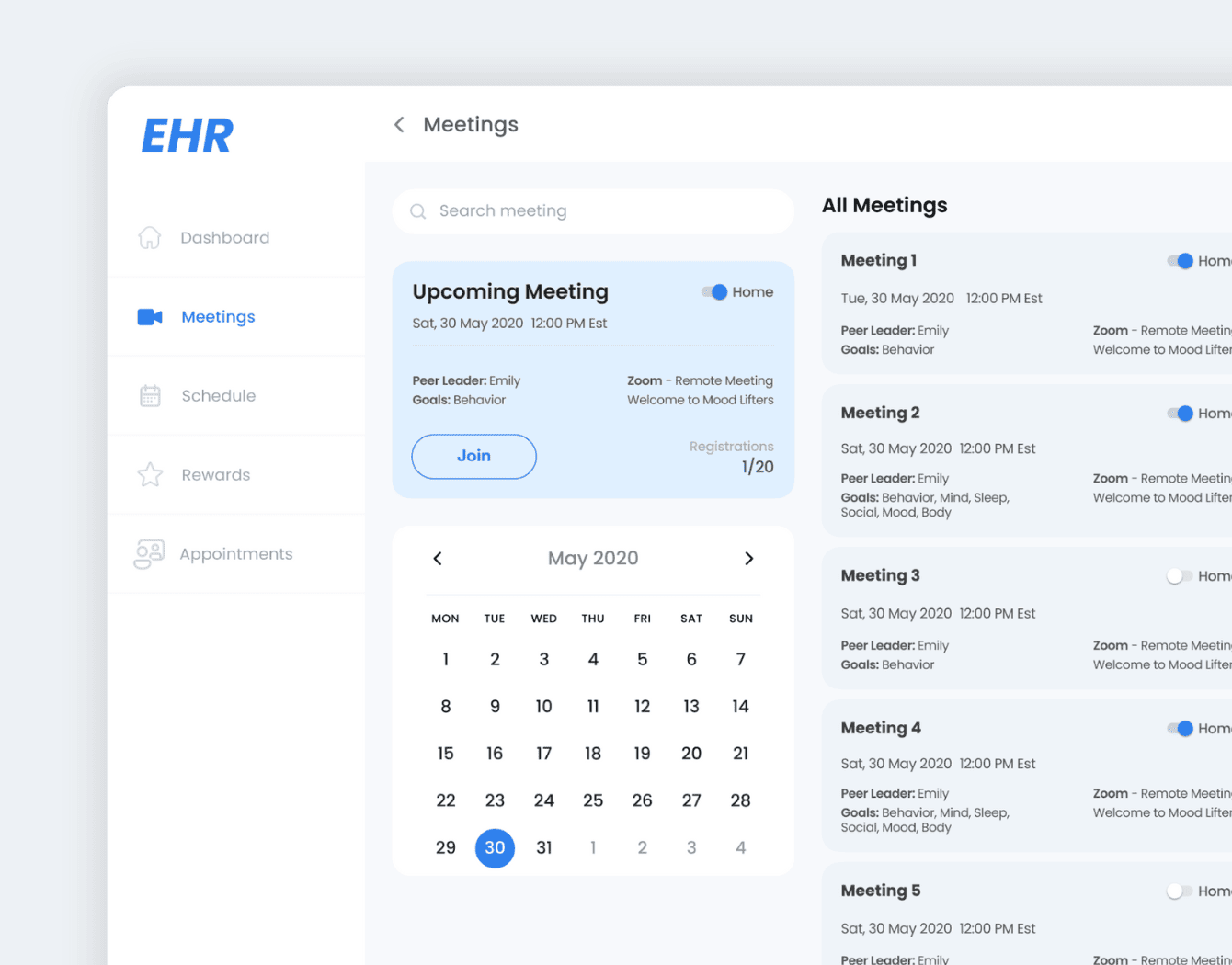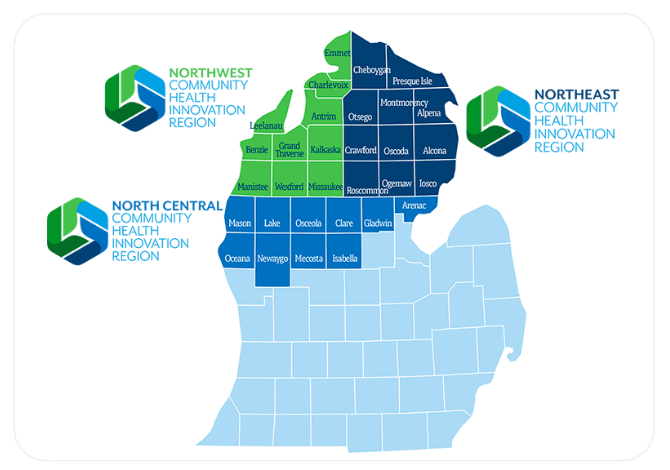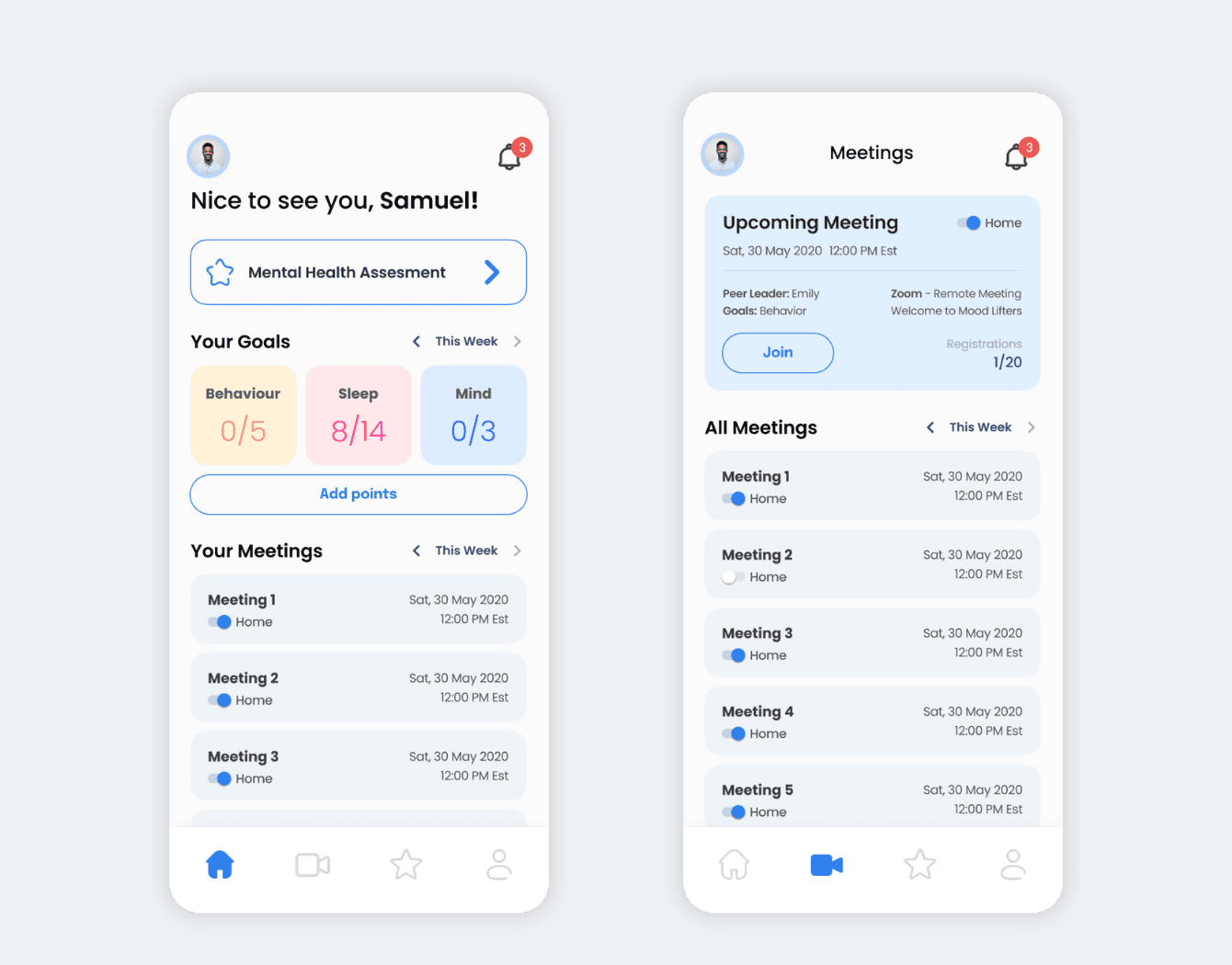About the Product
Moodlifters is a science-based revolutionary program that helps people reduce stress, anxiety, and learn new habits for their mental well-being. Empeek built an EHR system for Behavioral Health and iOS and Android mobile apps where users complete specially created surveys, can set up appointments with doctors, track weekly achievements, and receive rewards for their accomplishments.
The program is an addition to traditional therapy in many medical practices across the US and is actively used by thousands of patients.

What We Achieved
Saved Costs
No need to paying for subscription of third party that didn’t have necessary functionality.
Android and iOS Mobile Apps
A mobile application that transmits data to the web app.
Higher Operation Efficiency
The client can manage everything in one place and manual routine tasks are replaced with automation.
Increased Speed of Data Processes
We built an algorithm that analyzes responses of users to the treatment questionnaire and gives an instant result, saving hours of human-hours work.
Our Client
Northern Michigan CHIR
The NMCHIR is a partnership of various organizations aiming to improve health and well-being in Northern Lower Michigan, serving over 800,000 residents across 31 counties.
Industry: Healthcare
Location: USA, Northern Michigan
Visit the Website
Behavioral Health Market in The Post-COVID-19 Era
Compared to June 2019, when only 10% of US adults showed signs of depression and anxiety, the percentage has risen significantly during the COVID-19 pandemic, with approximately 40% of American adults experiencing these symptoms. Young adults are particularly affected, with over 56% experiencing similar mental problems and being more susceptible to substance abuse and suicidal thoughts.
The COVID-19 pandemic has long-term implications, with healthcare workers expected to experience ongoing mental health effects even after the pandemic ends. The increasing number of people experiencing mental health issues suggests others may also be affected. That’s why psychiatry EHR is in high demand.
The Story Behind the Psychiatry & Behavioral Health EHR/EMR Software
The work on the project started from scratch. The client came to us with the desire to begin mental health EHR development that will help to manage all its data in one place. The product is supposed to be used by three different parties.

Patients
The individuals that enroll to perform specific activities towards improving or ameliorating depression/anxiety symptoms.

Doctors
Specialists oversee the results of the participant screenings and based on them, take actions like accepting/declining their requests to register and reviewing their survey results.

Admins
Besides managing application content, they can change access roles in settings to have access to all the features that belong to other roles.
Goals Set to Empeek
- Create a solution that will manage and store all the patients’ data
- Automate the client management process
- Create a convenient reporting system
- Track all the patients’ treatment processes, from making appointments to accomplishing the goal
- Add a system of multiple surveys to assess the user’s condition precisely
- Ensure EHR mental health system development that is highly secure

Solution We Have Delivered
- Web, Server, Android, and IOS applications
- Multi-tenancy management
- Users CRUD
- Diverse role support
- Patient records distribution functionality
- Appointments scheduling system
- HIPAA-compliance application
- Extended reporting system
- PHI system and history tracking
Specialty of the Developed EHR and Practice Management Software for Mental Health
We’ve created web and mobile applications to help doctors and patients optimize the treatment process. Here are its most prominent particular features.
Sophisticated System Of Questionnaires
It aims to provide users with a personalized, evidence-based approach to tracking and managing their mental health. The system includes a range of questions of different types and evaluations. They are designed to assess various aspects of mental health, such as depression, anxiety, stress, and well-being.
Patient Management System
Mental health professionals can create and maintain patient profiles, including demographic information, medical history, and treatment plans. The system also allows specialists to track patient progress over time, including symptoms, treatment response, and achievement of their goals.
Extended Reports System
Based on the survey results, doctors, and admins can generate reports about the users’ condition and progress. It simplifies the work of both parties and helps track the users’ progress effectively.
Project Scope and Technology Stack
ReactJS + Redux
React Native + Redux
ASP.Net core
MS SQL Server
Key Features
Questionnaire System
The essential feature of the MoodLifters app is a complex questionnaire system. Each question has its type. Each type has different evaluations. Besides, many options exist for questions and answers in various formats. The complex reports are built based on this system.
The tests’ results provide valuable information about a user’s mental health status, symptoms, and treatment needs. They also help mental health professionals develop an effective treatment plan. For example, if a user scores high on a depression screening, their mental health professional may recommend therapy, medication, or other interventions to address their symptoms.
Patient Profile
It allows users to create and maintain a digital record of their mental health history, treatment progress, and other relevant information. The user securely accesses this information to facilitate more effective and personalized care.
Doctor Profile
This provides users with detailed information about mental health professionals available on the platform, such as therapists, psychiatrists, or counselors. Typically, it involves information about qualifications and credentials, the expertise area, experience, and availability. With the help of the Mood Lifters app, doctors can create patients, make appointments, set the users’ goals, and give rewards for achieving them. Moreover, doctors can make reports based on the information in the app.
Admin Panel
With it, administrators manage and oversee various aspects of the app’s operations. This includes managing user accounts, reviewing patient and doctor profiles, monitoring app usage and performance, and accessing analytics and other data about app usage. Besides, admins create new users, goals, and rewards for them. Moreover, they make reports based on user profiles and appointments.
Dashboard
The dashboard in a mental healthcare app is a valuable feature that helps users stay informed and engaged in their mental health treatment. By providing users with a centralized hub for accessing a range of features and tools, the dashboard makes it easier to stay on top of their treatment goals and achieve better mental health outcomes.
Scheduling
The scheduling feature allows users to view the availability of mental health professionals, choose a suitable time slot, and book online or offline appointments directly within the app.
Gamification
The Mood Lifters app offers its users rewards for making progress. By providing users with tangible benefits for achieving their goals, such as virtual rewards, the app motivates people to continue using the app and working towards their mental health goals.
Clients Review
Explore Our Core Healthcare Software Development Services
Project Discovery Phase
The aim of the Project Discovery is to understand project goals, risks, and stakeholders’ requirements before moving forward into further planning and development of the software product. This process sets the stage for the entire project by outlining objectives, opportunities, challenges, and details needed to guide the development team as well as business owners.
Learn MoreWeb App Development
We build interactive web applications that live on remote servers and can be accessed by users from anywhere. We use languages like HTML, CSS and JavaScript on the front-end and databases, servers and frameworks on the back-end to build functional, secure and scalable web apps with rich user experiences.
Learn MoreQA & Testing
We design test cases, scripts and plans to evaluate the functional, security, reliability and performance aspects of a software application. The goal is to identify defects, gaps or issues earlier on rather than post-deployment so we can address and resolve them during the development phases.
Learn MoremHealth App Development
We create applications for smartphones, tablets or wearable devices that can monitor, collect, analyze and give feedback to users about various health, wellness and medical data from sensors, user input and other connected sources. Empower your patients and improve health outcomes through greater engagement and access to information.
Learn MoreFAQs
What is EHR software for mental health?
EHR software is a digital platform designed to facilitate managing and organizing patient information and treatment plans in mental health settings. EHRs can store patient data such as medical history, treatment plans, medications, and progress notes.
What are the key features of EHR software for behavioral health?
The main ones are patient information managing and storing, treatment plans and progress notes, support for billing and reimbursement processes, and tools for tracking patient outcomes and measuring treatment effectiveness. Look for EHRs designed to meet industry data security and privacy standards.
Is behavioral health software HIPAA-compliant?
Behavioral health software must be HIPAA-compliant to ensure patient information’s privacy and security. The software must meet industry data security and privacy standards, including encryption, access controls, and data anonymization.
Can EHR software for mental health be integrated with other systems?
Yes, it’s possible to integrate with other systems, such as billing and scheduling software, laboratory systems, and telemedicine platforms. The integration allows clinicians to access all patient information in one place and reduces the need for manual data entry, which saves time and reduces errors.
How to make HIPAA-compliant mental health software?
HIPAA-compliant software must meet several requirements to ensure the protection of patient data. The main ones are implementing reasonable safeguards to prevent unauthorized access to PHI, ensuring that PHI cannot be altered or deleted without authorization, and providing authorized users with easy access to health records through integrated solutions.
Additionally, software developers must control all anticipated security risks and deploy necessary protection measures for data operations such as data exchange, storage, copying, etc. They should also provide essential role-based controls and data management tools within a user-friendly interface for authorized users.
What types of mental health apps exist?
Here are some common types:
- Meditation and mindfulness apps offer guided meditations, breathing exercises, and other tools to help users reduce stress and anxiety.
- Therapy and counseling apps connect users with licensed mental health professionals for online therapy sessions.
- Mental health assessment apps use screening tools to help users identify symptoms of mental health disorders and offer suggestions for treatment.
- Mood-tracking apps allow users to monitor their moods and track emotional patterns over time.
- Self-help apps provide tools and resources to help users manage symptoms of mental health disorders on their own.
- Sleep apps offer techniques for improving sleep quality and quantity, such as guided relaxation exercises and sleep-tracking tools.
- Journaling apps allow users to document their thoughts and feelings in a digital journal, helping to promote self-reflection and emotional awareness.
Overall, mental health apps offer various features and approaches to addressing mental health and wellness.
Do you need to provide certificates to list your mental health solution in app stores?
The requirements vary by platform and region. In some cases, app stores may require that you provide documentation or certification to verify that your mental health solution is safe and effective.
For example, the Apple App Store and Google Play Store have specific guidelines for mental health apps and require documentation to be submitted for review before the app can be listed. These guidelines ensure the app meets minimum privacy, security, and effectiveness standards.








